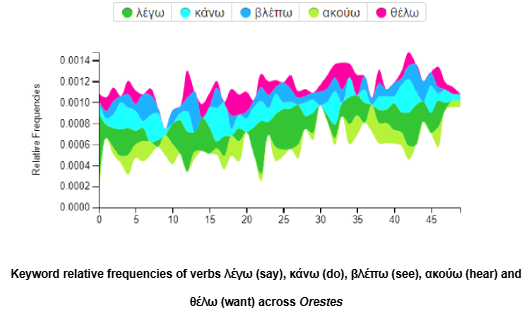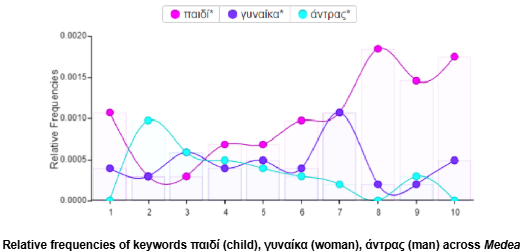
In autumn 2024, ILSP/Athena RC and the CLARIN:EL Infrastructure hosted Vassiliki Sampa, MA in Digital Humanities from Uppsala University, Sweden, during her Transnational Access (TNA) grant visit to explore the interesting topic: How did Euripides portray women? Exploring Gender Norms in Ancient Greek tragedies with Digital Tools for NLP.
The goal of the ATRIUM project (Advancing fronTier Research In the arts and hUManities) is to bridge 4 leading research infrastructures in: arts and humanities (DARIAH), archaeology (ARIADNE), language technology (CLARIN), and open scholarly communication in the social sciences and humanities (OPERAS). The Transnational Access (TNA) scheme offers fully funded placements for researchers across Europe. This initiative is designed to support Arts and Humanities researchers by providing access to expert knowledge, mentorship, and tools from leading Data Management organisations. Successful applicants have the opportunity to visit one of 14 different host organisations across Europe in order to conduct their research, benefiting from direct contact, knowledge sharing and network building.
Vasiliki Sampa applied for a TNA grant to ILSP/Athena RC, which offers the CLARIN:EL infrastructure of language resources and processing services as research platform; her TNA application focused on a research project titled Exploring Classical Gender Norms: A Textual Analysis of Euripides with Digital Tools for NLP.
 Four of Euripides’ plays —The madness of Heracles, Orestes, Medea, and Bacchae— were in focus. In many of his tragedies, Euripides centers on female protagonists. Labeled as a misogynist even from the 5th century B.C., Euripides features complex portrayals of women, with characters such as Medea, for example, who commits the tragic act of murdering her children. This negative perception of Euripides is a subject of debate, as on one hand, it is argued that his portrayals reinforce negative stereotypes of women, but on the other, that he amplifies women’s frustrations within a patriarchal society.
Four of Euripides’ plays —The madness of Heracles, Orestes, Medea, and Bacchae— were in focus. In many of his tragedies, Euripides centers on female protagonists. Labeled as a misogynist even from the 5th century B.C., Euripides features complex portrayals of women, with characters such as Medea, for example, who commits the tragic act of murdering her children. This negative perception of Euripides is a subject of debate, as on one hand, it is argued that his portrayals reinforce negative stereotypes of women, but on the other, that he amplifies women’s frustrations within a patriarchal society.
How can text analysis and NLP tools help us discuss this topic?
This research focused on the actual data of the tragedies, analysing the very words that Euripides put in the mouth of his male and female characters. The research was structured in four main stages:
- The texts of the four tragedies were collected from online sources and pre-processed; the pre-processing rendered them suitable for processing by the CLARIN:EL web-services
- The texts were uploaded as resources to the CLARIN:EL infrastructure, accompanied by the appropriate metadata and licenses; adhering to the FAIR principles made the resources available for research by other researchers
- Tools and services offered by the CLARIN:EL infrastructure were used for the automatic processing of the data, in order to analyse the language and themes related to gender in these four works by Euripides
- Finally, a stage of qualitative analysis of the results of the processing uncovered patterns in gender roles and how they are constructed in the tragedies.
 By studying which character (male or female) talks about which topics, as attested by the frequencies of the words they use, frequency of keywords and their collocations, the research aimed to shed light on the roles men and women have in Euripides tragedies. The linguistic analysis offers insights into language patterns and thematic emphasis, particularly on gendered roles. The linguistic and thematic analysis of gender across Medea, Bacchae, Heracles, and Orestes reveals that the tragedies resist simplistic gender dichotomies. While certain disparities in focus are evident—such as male characters’ association with authority and violence and female characters’ emphasis on grief and identity—the narratives also highlight overlapping concerns and shared human experiences. Both male and female characters grapple with familial obligations, divine interventions, and personal struggles, suggesting that gendered portrayals are intricately tied to the broader themes of the tragedies. The research concluded that Euripides does not merely reinforce conventional gender roles, but rather questions them, by exploring the existential and emotional dimensions of his characters.
By studying which character (male or female) talks about which topics, as attested by the frequencies of the words they use, frequency of keywords and their collocations, the research aimed to shed light on the roles men and women have in Euripides tragedies. The linguistic analysis offers insights into language patterns and thematic emphasis, particularly on gendered roles. The linguistic and thematic analysis of gender across Medea, Bacchae, Heracles, and Orestes reveals that the tragedies resist simplistic gender dichotomies. While certain disparities in focus are evident—such as male characters’ association with authority and violence and female characters’ emphasis on grief and identity—the narratives also highlight overlapping concerns and shared human experiences. Both male and female characters grapple with familial obligations, divine interventions, and personal struggles, suggesting that gendered portrayals are intricately tied to the broader themes of the tragedies. The research concluded that Euripides does not merely reinforce conventional gender roles, but rather questions them, by exploring the existential and emotional dimensions of his characters.

